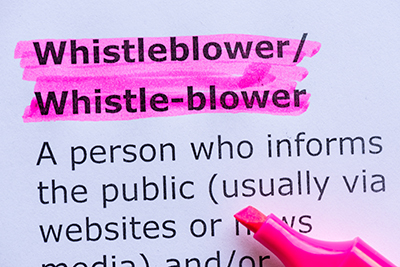A recent Oregon court decision based on facts arising long before COVID-19 may shed light on some of the issues facing employers when employees raise virus-related safety concerns.

Facts
Margherita Vergara was a housekeeper at a Eugene hotel operating under the business name Eugene University Inn & Suites. She sued Koomal Patel, a shareholder in the business, alleging statutory whistleblower claims. She sued just before the time to file her claims, the statute of limitations, ran out. Unfortunately, she mistakenly sued the wrong defendant and later amended her claims to add other defendants and a wrongful discharge claim.
The new defendants, however, had been sued after the statute of limitations had elapsed. They asked to dismiss the case without a trial, arguing the statutory claims had been filed too late and the wrongful discharge claim was barred because an adequate statutory remedy already existed.
The trial court dismissed the case, finding the claims were filed too late against the correct defendants. In addition, Vergara had an appropriate statutory remedy and couldn’t bring a common law wrongful discharge claim. She appealed.
Court of Appeals
On appeal, the Oregon Court of Appeals held the statutory claims made in the subsequent amended complaint would “relate back” to the time of the filing of the original complaint and were timely. Vergara therefore could proceed in court against the new defendants.
Most interesting in this time of COVID-19 was the analysis of Vergara’s wrongful discharge claims. Under Oregon law, an employee who is terminated in violation of public policy (e.g., for asserting a statutory right or reporting a violation of some public policy) may make a wrongful discharge claim.
Many statutes regulating employers already provide a remedy for this type of whistleblower. Wrongful discharge claims were meant to fill in only when statutory remedies weren’t adequate or available. If an adequate statutory remedy exists for the claimed wrongful act, a wrongful discharge claim isn’t available.
The court first dealt with whether a statutory remedy must both adequately protect the employee and reflect a legislative intent to eliminate the common law wrongful discharge claim. It concluded that if a sufficient remedy is available, a wrongful discharge is barred, even if there was no express legislative intent to eliminate wrongful discharge claims.
The court found Oregon law already provides adequate protection for an employee who complains about unsafe working conditions under its statutory health and safety whistleblower protections.
The court next analyzed Vergara’s claim she was terminated because she was trying to protect the public from communicable diseases by complaining about the lack of appropriate protective equipment and practices. She alleged she was fulfilling an important societal obligation by acting to stop the spread of disease.
Although stopping the spread of communicable diseases is an important purpose and general public policy would favor preventing them, no law imposed on Vergara any duty to prevent their spread. The court found such obligations were given to the Oregon Health Authority (OHA). Because she wasn’t fulfilling a public policy, she had no wrongful discharge claim.
Interestingly, the court noted an Oregon statute, ORS 433.010, provides no “person shall willfully cause the spread of any communicable disease within this state.” Because Vergara didn’t allege the actions here were willful, resolution of the issue wasn’t required. Vergara v. Patel, 333 Or. App. 288 (2020).
Bottom Line
Of course, nothing in the opinion discusses the COVID-19 pandemic, but it does provide some limited guidance. First, to the extent any employee complains about the lack of adequate protective gear or unsafe working conditions at work, they are protected from retaliation under Oregon statutory law.
A question that a later court will almost certainly be required to determine is whether there is protection for the same employee who complains the lack of adequate protective equipment or a failure to require people to use such things as masks may endanger the public.
One thing significantly different than in the Vergara case is that now COVID-19 is a national pandemic and the Oregon Health Authority has prescribed specific actions to be taken by businesses and individuals. It may well be that in light of the state of emergency and the requirements imposed by OHA, an employee who complains about her employer’s failures to follow the agency’s guidance will be protected under wrongful discharge law.
In addition, the issue still remains about whether an employee would be protected under wrongful discharge or statutory law if she complained her employer’s actions were willful. Here, given OHA guidance, a court very well could find a business that fails to follow its guidance is acting willfully.
Cal Keith is a partner with the law firm of Perkins Coie LLP in Portland, Oregon and can be reached at ckeith@perkinscoie.com.
